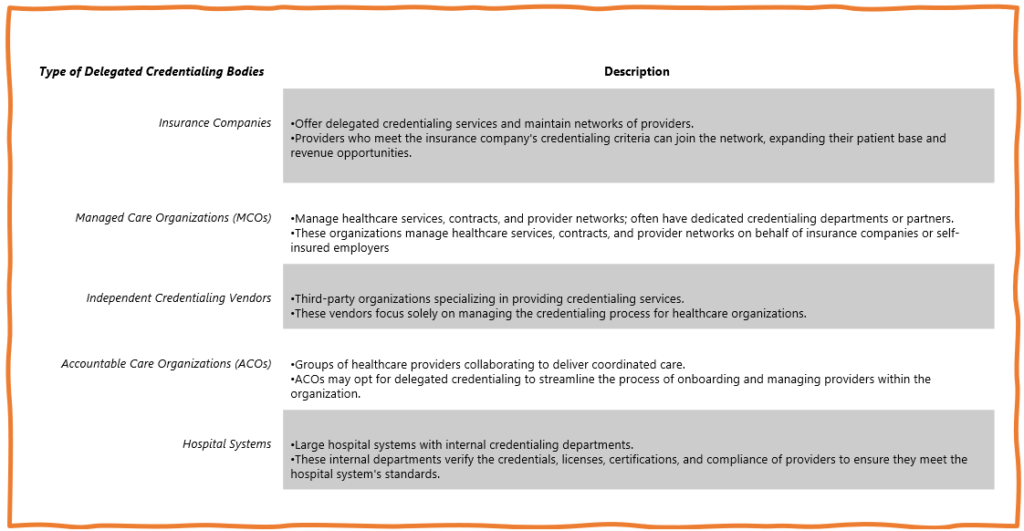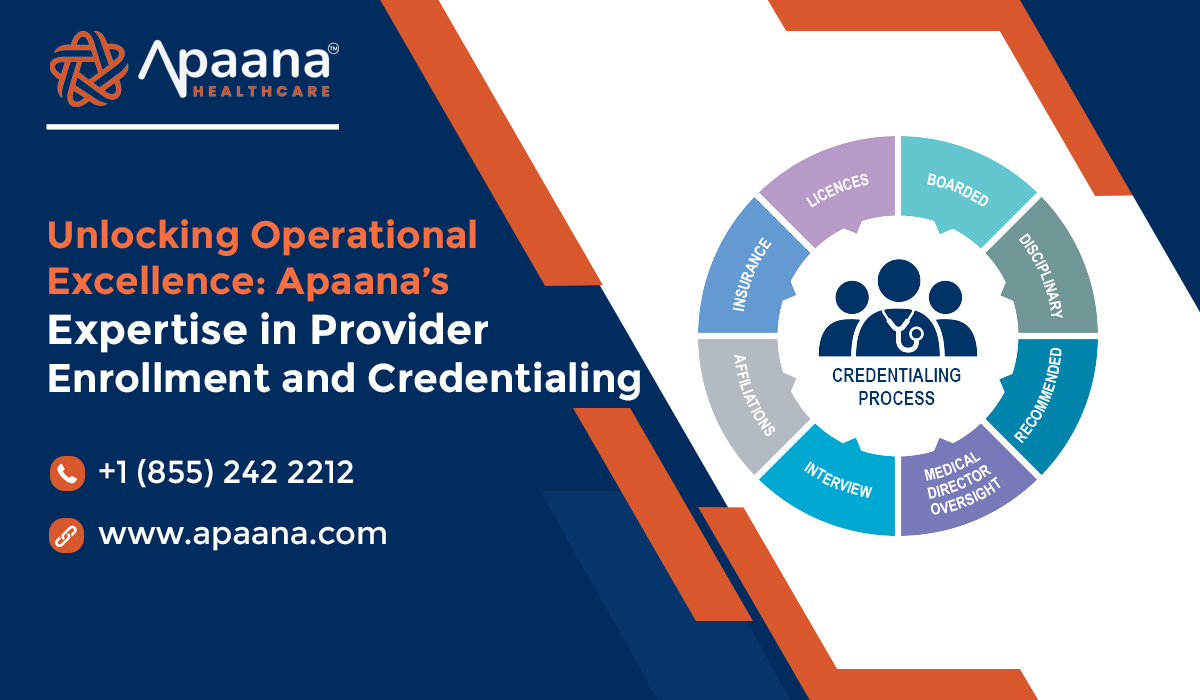
Introduction: Understanding Delegated Credentialing
Delegated credentialing plays a vital role in the healthcare industry, streamlining the process of verifying and granting provider credentials. It involves assigning the responsibility of credentialing to trusted third-party organizations, such as insurance companies or managed care organizations. These organizations take charge of verifying the qualifications, experience, and compliance of healthcare providers, ensuring they meet the necessary standards.
In delegated credentialing, the healthcare organization delegates the task of credentialing to these trusted entities, saving time and resources while maintaining high standards of quality and compliance.
For instance, let’s consider a large medical group looking to expand its network of physicians. Instead of handling the entire credentialing process in-house, they opt for delegated credentialing. They partner with a reputable managed care organization that specializes in credentialing services. This delegated entity meticulously verifies the credentials, licenses, and certifications of the prospective physicians, ensuring they meet the organization’s standards.
Key stakeholders involved in the delegated credentialing process:
- Healthcare Organizations: Organizations, such as hospitals, medical groups, or healthcare systems, are the primary stakeholders seeking credentialed providers. They delegate the task of credentialing to trusted third-party organizations.
- Delegated Credentialing Entities: These entities, often insurance companies or managed care organizations, specialize in credentialing services. They are responsible for thoroughly verifying provider credentials, licenses, certifications, and compliance with industry standards.
- Credentialing Committees/Boards: These committees or boards, consisting of medical professionals, review and approve the credentialing applications submitted by healthcare providers.
- Healthcare Providers: Providers, including physicians, nurses, and allied healthcare professionals, are the stakeholders in the delegated credentialing process.
- Regulatory and Accreditation Bodies: Government agencies and accrediting organizations, such as the Centers for Medicare and Medicaid Services (CMS) and The Joint Commission, play a role in setting standards and regulations for credentialing processes.
- Patients: While not directly involved in the credentialing process, patients are ultimately impacted by the quality and qualifications of healthcare providers. Delegated credentialing ensures that patients receive care from qualified and credentialed providers, leading to better outcomes and patient satisfaction.
Impact on Revenue Generation
- Improved efficiency and time savings: Delegating credentialing tasks to trusted third-party entities reduces administrative burden, allowing healthcare organizations to allocate their resources more efficiently. This streamlined process saves time by expediting the credentialing process, enabling providers to start practicing sooner.
- Enhanced provider network management: Delegated credentialing facilitates the management of a robust provider network. Partnering with credentialing experts ensures that the network consists of qualified and compliant providers. This expands access to a wider pool of providers, fostering collaboration and improving patient care coordination.
- Increased revenue generation opportunities: Delegated credentialing can positively impact revenue by enabling faster provider onboarding. Expanding the network attracts more patients, leading to increased patient volume and revenue generation. Additionally, efficient credentialing processes minimize claim denials and payment delays, optimizing revenue cycle management.
- Better patient satisfaction and outcomes: Delegated credentialing ensures that patients receive care from credentialed and qualified providers. This enhances patient trust, satisfaction, and overall experience. With qualified providers delivering quality care, patient outcomes are improved, leading to better health outcomes and patient loyalty.
- Increasing reimbursements and reducing claim denials: Delegated credentialing ensures providers meet the necessary qualifications, which minimizes claim denials and payment delays. Accurate and timely credentialing also improves billing and coding accuracy, leading to higher reimbursements and optimized revenue cycle management.
- Mitigating compliance risks and avoiding penalties: Delegated credentialing helps healthcare organizations stay compliant with regulatory requirements and industry standards. By ensuring providers are properly credentialed, organizations mitigate the risk of compliance violations, audits, and associated penalties that could negatively impact revenue.
Implementing Delegated Credentialing
Types of delegated credentialing bodies

Delegation Credentialing Requirements
Delegated credentialing requirements refer to the criteria and standards that healthcare providers must meet to be credentialed by a delegated entity. These requirements ensure that providers have the necessary qualifications, licenses, certifications, and compliance with regulatory and industry standards.
The specific delegated credentialing requirements may vary depending on the credentialing body or organization involved. However, some common requirements include:
- Education and Training: Providers are typically required to have completed the necessary education and training in their respective healthcare specialties. This includes obtaining relevant degrees, and certifications, and completing accredited residency or fellowship programs.
- Licensure: Providers must possess valid and unrestricted licenses to practice in the applicable jurisdiction. The delegated credentialing entity verifies the status and validity of these licenses.
- Board Certification: For certain specialties, board certification from recognized professional organizations may be required. Board certification ensures that providers have met the additional standards set by the specialty boards.
- Work Experience: Providers are typically required to have a minimum number of years of relevant work experience. This requirement ensures that providers have practical experience in their field and have demonstrated competence in delivering quality care.
- Malpractice Insurance: Providers are often required to have appropriate malpractice insurance coverage. This is to protect patients and healthcare organizations from potential liability in case of medical malpractice claims.
- Continuing Education: Providers are expected to engage in ongoing professional development through continuing educational activities. This helps to ensure that providers stay updated with the latest advancements in their field and maintain their competency.
In addition to these requirements, delegated credentialing entities may also conduct background checks, verify professional references, and assess providers’ compliance with ethical and disciplinary standards. Meeting these delegated credentialing requirements is crucial for healthcare providers to gain access to insurance networks, join managed care organizations, or become part of hospital systems.
Best Practice for Forming a Delegated Entity Credentials Committee
- Diverse Expertise: Include professionals with medical, administrative, and legal backgrounds for comprehensive evaluation.
- Clear Criteria: Establish transparent credentialing criteria based on industry standards and regulations.
- Documentation Management: Implement secure systems for managing credentialing documentation.
- Ongoing Training: Provide regular education to keep committee members updated.
- Standardized Processes: Develop consistent workflows for reviewing applications and making decisions.
- Quality Assurance: Conduct peer reviews and audits to ensure accuracy and effectiveness.
- Continuous Improvement: Regularly review and update policies based on feedback and industry developments.
These practices ensure thorough evaluation, compliance, and high standards of quality and patient safety.
In conclusion, APAANA Healthcare recognizes the increasing demand for delegated credentialing and understands its benefits in reducing administrative costs for health plans. Don’t hesitate to reach out today to schedule a demo and discover how Apaana Healthcare can empower your organization in meeting credentialing requirements effectively.
Reference
- Healthcare Financial Management Association (HFMA) – Their website offers articles and resources on credentialing and its impact on revenue generation: https://www.hfma.org/
- American Medical Association (AMA) – AMA provides insights and guidelines on credentialing in the healthcare industry: https://www.ama-assn.org/
- Centers for Medicare & Medicaid Services (CMS) – CMS provides information on healthcare regulations and credentialing requirements: https://www.cms.gov/
- The Joint Commission – Their website offers resources on accreditation and credentialing in healthcare organizations: https://www.jointcommission.org/
- National Committee for Quality Assurance (NCQA) – NCQA provides standards and guidelines for credentialing in healthcare organizations: https://www.ncqa.org/





